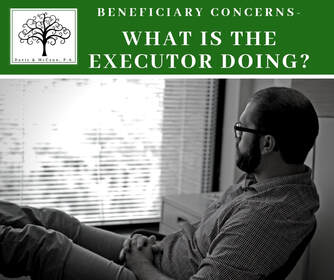 You’ve been named as a beneficiary of someone’s Last Will and Testament! What does that mean and what can you expect? As a beneficiary, the Grantor of the will named you to receive something from their estate. It could be anything from cash, stock, investments, real estate, minerals, or a personal possession. An Executor is the person the Grantor named to be in charge of managing estate assets, paying estate bills, working with the estate accountant and attorney, distributing the estate assets, etc. This is the first person to whom you should address your questions about the estate. As a beneficiary, you have certain rights in the probate case. Here’s a few pointers on what you can expect from the Executor and the probate process: Executors have fiduciary duties and must put the interest of the estate before their own personal desires, even if they also are a beneficiary of the will. Although Executors are required to act prudently, many Executors lack the skills or knowledge they need to handle an estate administration. Without professional guidance from an experienced attorney, Executors can easily mishandle an Estate and be subject to monetary and legal ramifications. Executors must: 1. Put estate beneficiaries’ financial interests above their own; 2. Protect estate assets by preserving their value until final distribution; 4. Be impartial toward all beneficiaries regarding distributions; 5. Follow the instructions given in the will; 6. Keep good financial records of all estate account activities and provide a copy of these records to beneficiaries upon request; 7. Pay estate bills and beneficiaries when deemed appropriate by the Court or according to state law (creditors are paid before beneficiaries, so final distribution amounts may be lower than what is stated in the will); and 8. Communicate with creditors and beneficiaries pursuant to state law. Executors cannot: 1. Put their own financial interests above those of the beneficiaries’; 2. Make a profit from their position by charging the estate unfairly for their services (fair and reasonable executor compensation is not considered profit); 3. Buy estate assets without express permission from all beneficiaries, unless the Grantor has specifically authorized this right to purchase in his/her will; or 4. Co-mingle their personal assets with estate assets. In Kansas, to serve as an Executor, you must be 18 years old and of sound mind. It is not necessary that the Executor live in the same state as the Grantor. However, if the Grantor’s will is being probated in the state of Kansas, the Executor will need to appoint an agent residing within the state to assist with duties during the probate. Oftentimes, this will be the attorney handling the estate. While Executors do not have to answer every, single question a beneficiary has, they must keep a beneficiary informed in regards to the estate and how it is being handled. As a beneficiary, you cannot insist on a distribution until the will is probated and all valid estate claims have been paid. You usually should not expect an estate distribution until 12-18 months after a person’s death. As a beneficiary, if you believe the Executor has failed to act appropriately and has put estate property at risk, it is important that you act quickly; do not wait. You should request in writing, a copy of the will and an accounting of estate accounts. If you are unable to resolve your concerns amicably with the Executor, you should retain your own legal counsel. If there is evidence of Executor misconduct, you may have grounds to remove or replace them. Be aware that the lawyer who probates the will is hired by the executor and represents the executor, not you as a beneficiary. Although many estate attorneys are willing to explain basic information and answer simple questions from beneficiaries, the estate attorney cannot provide you with independent legal advice regarding your concerns as a beneficiary. You must hire your own lawyer for that. For more information regarding beneficiary rights and Executor obligations, please contact Davis & McCann, P. A., Dodge City, KS. We are members of Wealth Counsel, a national consortium of Estate Planning Attorneys and the National Academy of Elder Law Attorneys (NAELA). We focus our practice on providing clients with the best legal advice on estate planning, Medicaid and long-term care planning, business formation, family business/small business succession planning, probate, trust administration, real estate, and related matters. Comments are closed.
|
NEWS YOU CAN USEDavis & McCann, P. A., Archives
April 2021
Categories
All
|

 RSS Feed
RSS Feed